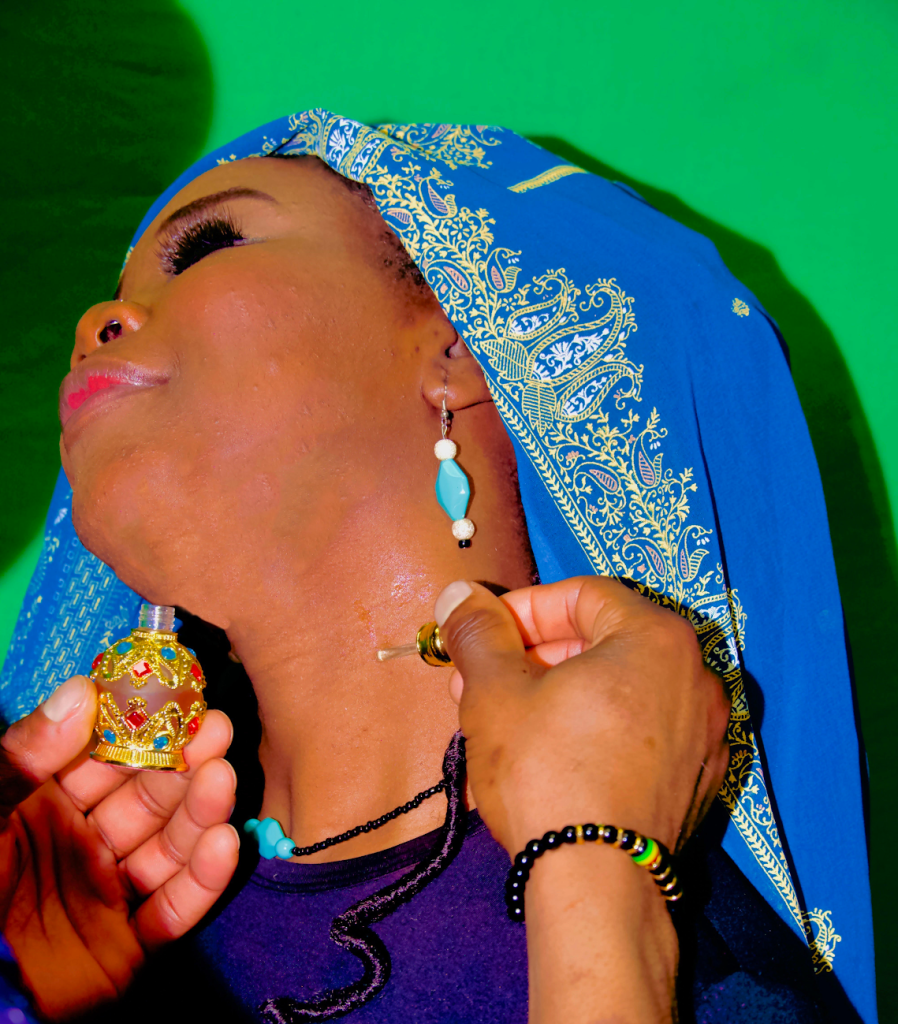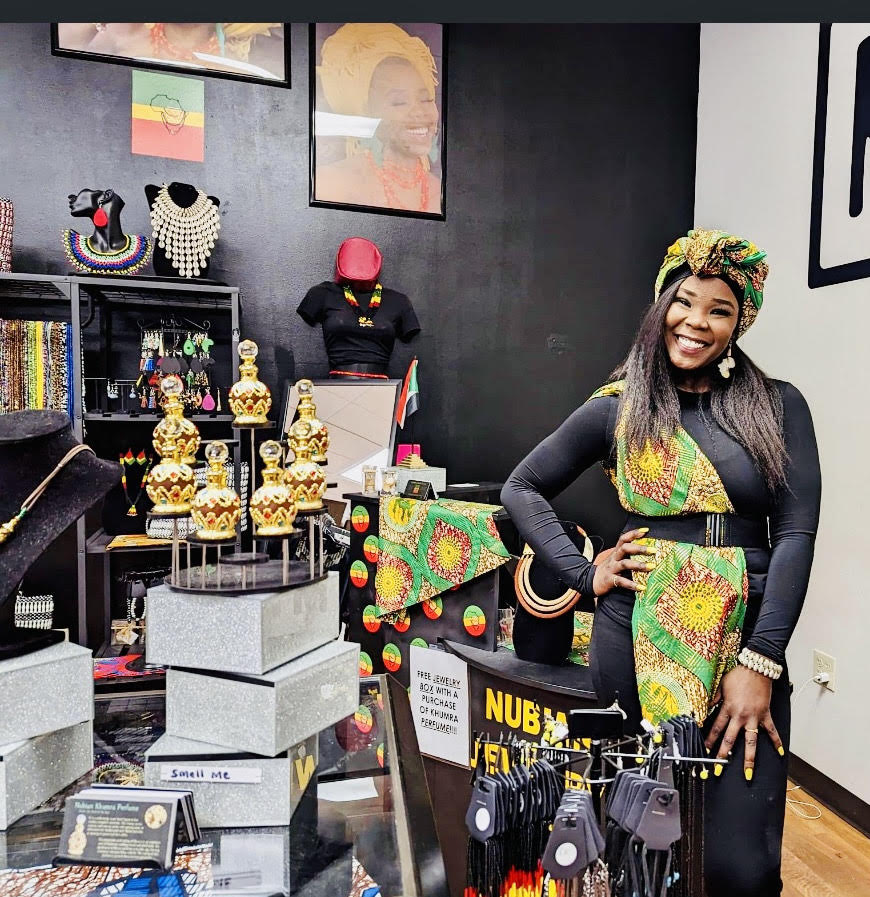Standing next to Khumra perfume! Traditional perfume made out of special perfumes including pure Sandalwood oil, and dufra (onycha; roasted seashells lids) grinded on the sandalwood.
Photos by Nubian Jewelry
By Deborah Walker
TNCPNEWS
LANSING, MI – African culture is as diverse and unique as the land’s people, cultures, and languages. As beautiful and rich as the styles are, many have yet to experience them. Rihab Musa, entrepreneur and founder of Nubian Jewelry, has unique, handcrafted designs that are the solution. Combining traditional Nubian culture with contemporary style, Musa has created custom-made jewelry “rooted in your true self and can touch you in a deeper, more spiritual way.”
Walking into Nubian Jewelry in Middle Village Micro Market in Downtown Lansing, Musa’s display of beautiful African jewelry is as distinctive and special as its story. Rows of brightly colored jewelry and Musa’s warm smile greet customers as they enter. Situated amongst many other micro businesses, Nubian Jewelry is more than a fashion statement; it is a glimpse into a rich culture.
How Nubian Jewelry began
After graduating with a Master’s degree in Psychology from Western Michigan University, Musa was unemployed. Unable to find a job right after graduation, Musa said she felt “anxious” about the future and nervous about her employment prospects. She started officially making jewelry in 2020 when the COVID-19 pandemic struck; Musa said she was unemployed and unable to leave her house. “So, at that time, I was looking for a job and couldn’t find one. My mom also had surgery, so it was just her and me at the house. I suggested we do something together so we wouldn’t be bored,” said Musa.
It was decided that the two would make jewelry to help pass time. Creating beautiful items that also held cultural significance helped with Musa’s anxiety and the stress of being unemployed. Eventually, Musa said she found a job as a mental health worker. She said the experience of landing her first job in her field was “exciting, nerve-wracking and an emotional journey.” Although she was now a mental health worker, Musa continued her jewelry-making passion.
The beauty of Musa’s jewelry caught the attention of her sister, Ragis Musa, who suggested that she present her pieces in an African gala showcase at Central Michigan University. Taking her sister’s advice, Musa attended the gala and received many more compliments. Excited by the positive feedback, the enthused jewelry maker decided to continue with her designs.
Inspiration for the jewelry
Musa’s Sudanese heritage and background are the sources of inspiration for her unique designs.
“We are from the Nubian tribe, and so everything we make resembles back home,” Musa explained. Her style, from the patterns to the colors, reflects the Sudanese culture in every detail.
Being from a different country came with unique challenges for Musa. She and her family fled from the war-torn country Sudan and moved to the United States for better opportunities.
“Moving to America at the age of eight and not speaking any English or the culture, I immediately started to adapt to society. I saw that I was different and did not like it, so I started getting lost in actively trying to fit in. Doing my best to neglect my Nubian side to avoid getting bullied resulted in an increase of anxiety and depression. I was ashamed of my accent, skin color, and, most of all being different,” said Musa.
In 2008, Musa and her family went back to her home country, Sudan. That trip changed the trajectory of how she felt about who she was.
“I witnessed all the beautiful rich culture, traditions, dances, and beliefs made me feel at peace. I automatically felt the love and acceptance that I deprived myself from,” Musa explained.
In addition to her trip back home in 2008, Musa returned to her homeland in 2023. Even though she has only visited twice in twenty-three years, the connection she felt visiting as an adult furthered her resolve to live her best life and to accept who she was and what she had to offer.
Musa said she wants to give back to her Sudanese community, which has experienced tumultuous times. When she started Nubian Jewelry, it was in hopes of helping the people back home. She also expressed that the government bombed the institutions whenever a hospital or school was built. Musa stated there is a bit of a peace treaty, and the genocide and war have recently stopped.
“The Nubian people have struggled over the years to get a good education under a very difficult situation, even at times of attacks by Al Bashir government. They started schools inside the caves, under the shadow of big trees and under big open verandas built of wood and grasses from the year 1980 until the present with only a few teachers who had committed themselves to work for free to help those generations get the best quality of education as far as they could and later there were few trained young volunteers who were to help cover the rest of classes, but they still need books and school articles and materials,” said Musa.
According to Aljazeera, “Sudan’s transitional government and several rebel groups have signed a peace agreement aimed at resolving years of war in which hundreds of thousands of people died and millions displaced in different regions across the country.” The peace treaty was signed in 2020. Musa said there is a link on her website to learn more and to donate, www.nubian-jewelry.com.
Musa informed that three percent of her earnings would be used to help the Nubian people. The proceeds would help rebuild hospitals and schools and help with other resources. Giving back was the foundation of how Nubian Jewelry got started.
“The thing about my jewelry is that it has a culture and meaning behind it. It’s not the typical jewelry that has no meaning,” said Musa. “The term Nubian king or queen has been thrown about loosely. However, Nubian is not just a phase. That’s my tribe, and I’m trying to showcase that and educate others about the Nubian people.”
LEAP – One and All program
Musa said that Lansing Economic Area Partnership (LEAP) was instrumental in assisting with formulating a structured business plan. LEAP is an economic development organization representing the tri-county region of Clinton, Eaton, and Ingham counties in partnership with the Michigan Economic Development Corporation. They are a private-public partnership governed by a board of directors, including business and municipal leaders across the tri-county region.
Attending the LEAP’s One and All program is for people who want to start or grow a business but lack the necessary knowledge and network relationships. It is an eight-week program to support more equitable access to successful entrepreneurship and small-business ownership through webinar-based learning, networking, mentorship, business coaching, engagement with subject matter experts, and access to an extended resource network.
Musa explained that thanks to the help of the One and All program, upon completion, participants are awarded a $2,500 grant to help them get their businesses started. She learned of the LEAP program in 2021 while selling her jewelry as a vendor. Upon further investigation, she realized the program could help her develop her business further. Her mentor in the LEAP program, Julie Reinhardt, Director of Downtown Community Development, asked if she wanted to open a storefront and Musa agreed.
Middle Village Micro Market invited Musa to open a storefront in their location, and Musa said she jumped at the opportunity to be in a brick-and-mortar location. The entrepreneur said she recently graduated from the LEAP program and will have her own storefront soon. What she learned Musa said her greatest lesson has been time management.
In addition to making jewelry, Musa said she has a private practice in the mental health industry. She is also a part-time life director at her church. Juggling multiple jobs comes with challenges for managing time. She added that working three jobs had taught her she needed help and could not do it alone. As an advocate for people of color and mental health awareness, Musa said mental health is just as important as physical health. Her first job in the mental health industry was in Owosso, MI, but after a year, Musa wanted to work with an urban population, so she relocated to Lansing. Removing the Black community’s stigma toward mental health treatment is essential to Musa. It is all right to take care of your mental health, she added.
Future Plans
Diversifying her merchandise line is a top priority for the entrepreneur. Musa said she is getting more inventory for men as her business grows. In the beginning, Musa explained that most of her products were directed toward women. However, she is now beginning to obtain products for men because she wants to include them as well. A clothing line is also in development for the entrepreneur. She said her clothing line would feature modern African clothing for men, women, and children.
As a family business, Musa said her aunt, Akhlas Kago, would help make the clothing. All of the materials are from Sudan. The creative designer is still participating in vending shows. Her last show was on March 18, 2023, with feature speaker Dr. Umar Johnson in Lansing, MI.
Musa’s advice for those who want to open their own business and step into entrepreneurship is not to let insecurities stand in the way of success. “There is always something in your heart that is pulling you to do something, but there is always fear that stops you—not allowing your fear to get in the way of whatever your purpose is calling you to do. Do not let fear get in the way of what you are destined to do,” Musa concluded.
To learn more about Rihab Musa, her beautiful jewelry designs, and other products like African clothing and handmade Khumra perfumes, go to www.nubian-jewelry.com or email her at nubian.jewelry@gmail.com. They can also be followed on Facebook. Nubian Jewelry is located at 112 S. Washington Square in downtown Lansing. Stop in or give them a call at 616-755-8288.






